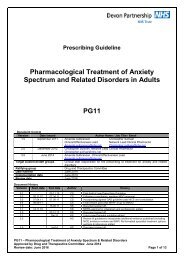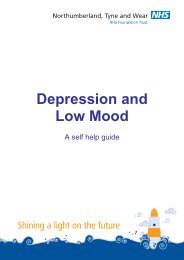Board of Directors Meeting - 29 March 2012 - Devon Partnership ...
Board of Directors Meeting - 29 March 2012 - Devon Partnership ...
Board of Directors Meeting - 29 March 2012 - Devon Partnership ...
- No tags were found...
Create successful ePaper yourself
Turn your PDF publications into a flip-book with our unique Google optimized e-Paper software.
Appendix 4<strong>Board</strong> <strong>of</strong> <strong>Directors</strong> <strong>Meeting</strong>, <strong>29</strong> <strong>March</strong> <strong>2012</strong>Agenda Item 9The Equality Delivery Council (EDC) was established in 2009 and includes Director Generals <strong>of</strong> theDepartment <strong>of</strong> Health, representatives from each strategic health authority and other interests. TheEDC supports NHS staff and organisations to work closely with the communities they serve to deliverservices that are personal, fair and diverse; to champion continuous improvement in the quality <strong>of</strong>patient services; promote good practice; and support the NHS to implement the Equality Act 2010.The EDS is one <strong>of</strong> the first products initiated by the EDC. The purpose <strong>of</strong> the EDS is to drive upequality performance and embed equality into mainstream NHS business. It has been designed tohelp NHS organisations, in the current and new NHS structures, to meet:-The requirements <strong>of</strong> the public sector Equality DutyEquality aspects <strong>of</strong> the NHS ConstitutionEquality aspects <strong>of</strong> the NHS Outcomes FrameworkEquality aspects <strong>of</strong> CQC's Essential StandardsEquality aspects <strong>of</strong> the Human Resources Transition FrameworBenefits <strong>of</strong> the EDSOnce effectively implemented the EDS will:Help the NHS deliver on the Government’s commitment to fairness and personalisation,including the equality pledges <strong>of</strong> the NHS Constitution and maintain a focus on equality duringthe NHS transition.Help organisations to respond more readily to the Equality Act duty – something they will needto do in any event.Deliver improved and more consistent performance on equality.Support commissioners to develop commissioning plans that address needs <strong>of</strong> theircommunities, especially local needs and local health inequalities.Help providers to respond better to CQC registration requirements.Improve efficiency and bring economies <strong>of</strong> scale by providing a national equalities frameworkfor local adaptation.Provide excellent evidence <strong>of</strong> engagement and consultation with patients and staff.As the foundations <strong>of</strong> the NHS are being recast, it is an ideal opportunity to put fairness into theheart <strong>of</strong> the new NHS. The introduction <strong>of</strong> the EDS as a vehicle that will help NHSorganisations to meet their public sector equality duty obligations (which has to be publishedon 31 January <strong>2012</strong>) from 1 April <strong>2012</strong>.Which functions do the EDS apply to?The EDS applies to both NHS commissioners and NHS providers – both in the current NHS and thenew NHS as set out in the White Paper and Health & Social Care Bill. This means that the EDSapplies to Primary Care Trusts/PCT Clusters (PCTs), until they are abolished, and to GP Consortiathat emerge to take over the commissioning work <strong>of</strong> PCTs, from 1 April 2014.Page 74 <strong>of</strong> 156
















